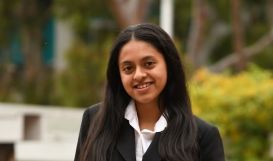Did your experience of the Earthwatch Student Challenge influence what you decided to study at university?
While on my Earthwatch student challenge, I received my Year 12 results and ATAR score. It was one very nervous day, to say the least. Due to the timing of the program, I had already submitted my university preferences, which were a broad spread of environmental science courses. While at university my experience in the Earthwatch did not dictate my choice of subjects, however, it did majorly assist in my ability to tackle the hands-on lab work, particularly around water chemistry and macroinvertebrate studies. It also gave me genuine science experiences to draw on in various assignments throughout my studies.
How did you find yourself working as a field ecologist at Calperum Station with students in the Earthwatch Student Challenge?
During my time at Calperum Station, as a graduate ecologist fresh from university, I became a part of the environmental conservation industry. I also had the opportunity to be a field assistant on an adult Earthwatch program which was running on the station during this time. At the end of my graduate year, I was given the opportunity to stay on as a field ecologist with a growing focus on the educational programs side of the organisation. As I gained more experience I was given more responsibility, working my way up to Program Manager.
In what way are you involved in the Earthwatch Student Challenge expeditions at Calperum Station?
Currently, I am the Program Coordinator as well as a field assistant for Earthwatch Student Challenges at Calperum Station. This means that I am responsible for working with the senior ecology team to design the programs the students will take part in. This is all structured around the current research we are conducting on the station. I also coordinate with Earthwatch staff to share behind the scenes details of each program from the Calperum Station point of view. For example, double checking risk assessments and briefing documents. During the Student Challenge programs, I am responsible for ensuring things are running smoothly, such as ensuring catering are aware of dietary requirements, customer service staff have vehicles and bedding prepared, etc.
I also wear a second hat of field assistant. This means that during the day I am also out in the field running research projects with participants in a scientist role. Away from research time I also run the initial safety briefings and program introductions when participants arrive. On some evenings I run more relaxed activities such as spotlighting and star gazing as well as assist the Earthwatch staff members with any arising issues or incidents which present themselves throughout the program.
What does a typical day at Calperum Station involve for you?
At the moment, a typical day at Calperum involves preparing for future programs. This involves writing risk assessments, liaising with schools, and producing new activity resources. I also try my hardest to keep my head around the current research happening on the station. Field research is a decreasing focus of my position, rather I am working more as a field assistant for the other ecologist at the station. This keeps my passion growing, as well as ensuring that I am sharing the latest information with students about what we are doing and the current practises in the conservation ecology field.
What else are you currently working on?
At present one of my main focuses is in building up the education programs at Calperum Station to allow more members of the wider community access the environment. These range from working with before and after school care OSCH programs and special schools to give students the opportunity to get out and get dirty and grow a connection with nature again. I also work with middle school students' to expose them to the industry of ecology and land conservation and showing them real-life applications of classroom taught concepts. Running senior level programs to help grow and feed students passion for ecology and give them exposure to what possibilities there are for future careers and studies, as well as start building up their networks in the industry.
Where do you see yourself in ten years? What does the future hold?
I have discovered that my passion lies in the environment sector and in assisting the next generation to discover, grow, and feed their passion in this field. In 10 years’ time, I can see myself still in this industry, either in a school setting or an external educational organisation. In the near future, the possibility of me returning to university to complete my Master of Teaching is definitely on the cards so I am able to continue along this path.




